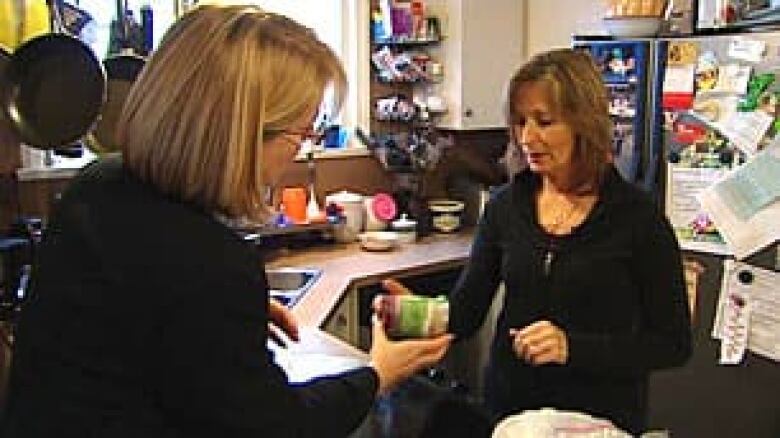Near-fatal allergic reaction caused by Starbucks dessert
Peach Yogurt Parfait label had no mention of nuts

The Canadian Food Inspection Agency is investigating Starbucks' labelling practices, after a young woman ate a parfait from a Coquitlam, B.C., outlet and almost died.
"I was shaking. My eyes were rolling into the back of my head. I wasn't breathing," said Kristin Gardiner. "The ambulance attendant later told me they couldn't get me to breathe."
Gardiner is allergic to nuts. On May 19, 2008, Gardiner said she ate a Starbucks Peach Yogurt Parfait — after finding no mention of nuts in the listed ingredients and being assured by a Starbucks employee that it was nut-free.
"I am very careful with what I eat and what I consume, and I always read things," said Gardiner.
'There's nothing in it,' customer was told
"Even after reading it, I gave it to the girl and asked her, 'Can you guarantee I will eat this and nothing will happen? I am highly allergic to nuts.' She says, 'No, it will be fine. There's nothing in it. It doesn't say anything. If it did, it would be labelled.'"

The product included a granola topping, but the label listed the granola ingredients as "rolled oats, brown sugar…." Gardiner said the parfait was the first thing she ate that day.
Almost immediately after eating the dessert, Gardiner said she started feeling itchy. Within minutes, she couldn't breathe. She went into anaphylactic shock as the ambulance arrived.
"I was dying. There was no oxygen going to my brain," she said.
CBC News asked Starbucks for an interview last week about the incident and received the following email:
"Thank you for reaching out. Unfortunately, I cannot provide an on-camera interview," wrote spokesperson Trina Smith. "We are truly sympathetic to Ms. Gardiner's injuries. We are continuing to investigate."
Gardiner, a single mother, worked at a grocery store near a Starbucks on Como Lake Avenue in Coquitlam. She had gone into the shop to get a coffee on her break. She was hungry, she said, but she knew she couldn't touch any of the baked goods, because they might contain nuts.
"I was originally just going to go in there and get a coffee, but I only have a half-hour lunch, so while I'm waiting in line I'm looking at my watch saying, 'OK well I've got 15 minutes left I better just grab something' and I started reading the [yogurt] label."
Gardiner credits an ambulance paramedic with saving her life. After spending two months at home on sick leave, Gardiner was left with permanent damage to her right eye.
"I couldn't see. I'd look at everything and it would just all be blurry. My eye would twitch and I'd just get these massive headaches and severe dizziness."
Product not removed after incident
Within days of the incident Kristin's mother, Norma Gardiner, said she went into the same Starbucks outlet to see if a warning label had been put on the parfait containers. The label hadn't changed, she said, and when she asked an employee if the product contained nuts, she said she was also told it did not.

"I just thought they don't care," she said. "I thought, if they don't do something, something even more serious is going to happen. Somebody else is not going to come out of it."
Shortly after visiting the shop, Norma Gardiner contacted the Fraser Health Authority, which launched an investigation. Records show environmental health officer James Wong inspected the Starbucks and asked for a copy of the incident report the shop had on file.
Wong's notes indicate the restaurant manager spoke to someone at Starbucks' Seattle head office and was told not to release company information. Under B.C. law, licensed food outlets are required to hand over any relevant documents health inspectors ask for.
"Manager … became tentative and evasive after speaking over the phone to someone at the customer service desk in Seattle," Wong wrote.
He then wrote a letter, citing the law and demanding the report, which Starbucks eventually produced. That incident report, signed by the manager and sent to Seattle, reads, "Customer came in and bought parfait and had an allergic reaction to nuts … we don't know any of the details."
"It is important to note the approach by Starbucks towards responding to this call," Wong wrote in an email to the Canadian Food Inspection Agency (CFIA), "Food allergy may be potentially troublesome and of serious consequence towards the health of its paying customer … timely information is key."
"They had no concern for Kristin's health," said the woman's mother. "There wasn't even a phone call [from Starbucks] to see how she was doing."
Wong turned the file over to the CFIA, which has jurisdiction over manufactured food labelling. CFIA spokesperson Mark Clarke told CBC News the investigation has not yet been completed.
CLS Catering Services Ltd. is the company that supplied the parfait to Starbucks. CLS operations manager David Wainman didn't respond to a CBC News request for an interview, but also sent a statement.
"CLS views food safety as its number one priority and was very concerned at learning that a woman suffered a severe allergic reaction … CLS has and continues to actively cooperate with all parties to investigate," Wainman wrote.
Starbucks offers a coffee card
Gardiner said she called Starbucks head office in Seattle weeks after the incident to discuss what had happened to her, and she was offered a Starbucks coffee card.
"'Sorry for the inconvenience. How about we send you a Starbucks card?'" she quoted the employee as saying. "These people didn't want to do anything for me except for send me a coffee card and brush me off. I almost was put in the grave because these people didn't label properly on their product."
Vancouver allergist Dr. Amin Kanani said the companies involved should have taken immediate, voluntary action.
"Foods have to be labelled clearly and properly," Kanani said. "They should have, of course, taken all these foods off their shelf immediately if they were mistakenly labelled [as] not containing nuts."
Kanani is part of a group of several organizations, lobbying the food industry to take food allergies more seriously. He said six per cent of children and four percent of adults in Canada can die from eating certain foods.
"We do see this problem — where people don't realize how significant a food allergy is. A real food allergy is life-threatening," he added.
'I was dying. There was no oxygen to my brain.' —Starbucks customer Kristin Gardiner
Records indicate, the CFIA told the companies involved to put a warning label on the product, which was done10 days after the incident. The parfait now has fine print, which says, "may contain tree nuts…"
Kristin Gardiner believes Starbucks only took action because it had to, after her family complained to authorities. She now wants the company to compensate her for the two months she had to take off work, and the cost of special glasses.
"I have a six-year-old to support and not having the money from work — I had nothing," she said. "I don't make a lot of money, and the little money I do have just gets me by.
"I am also trying to make a point — and have people see what happened — and maybe next time this wont happen to anyone else."